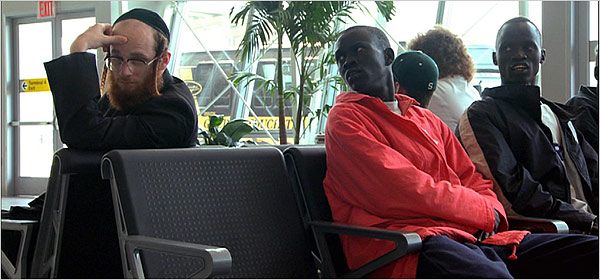|
Reviews of Recent Independent, Foreign, & Documentary Films in Theaters and DVD/Home Video
Directed by Christopher Quinn. Produced by Molly Bradford Pace & Quinn. Director of photography: Paul Daley. Edited by: Geoffrey Richman. Music by: Mark McAdam, Mark Nelson & Jamie Staff. Released by Newmarket/National Geographic Films. Counry of Origin: USA. 90 min. Rated PG. Narrated by: Nicole Kidman. In the Sudanese civil war between the Arabic Muslim north and the black Christian and animist south, two million southerners have been killed and another four million displaced since fighting erupted in 1983. Less than half of the 27,000 orphaned boys who survived a thousand-mile trek from the south to Kenya found refuge at a United Nations encampment. God Grew Tired of Us follows three selected “lost boys,” named for Peter Pan’s self-sufficient orphaned cohorts, to their resettlement in Rust Belt America. Seen through the eyes of the newly arrived refugees, the tour of a plain two-bedroom apartment in Pittsburgh, PA, is one of the few times this skimpy but timely documentary conveys their sense of bewilderment: turning off and on a lamp, bathroom etiquette, and the disposal of trash in a bin rather than out of a window. While the men are introduced to such cuisine as sprinkled donuts on a visit to a florescent supermarket, an older white male grimaces towards the camera. Then the scene ends. Later, according to narrator Nicole Kidman, local merchants feel intimidated by these black men and have asked an intermediary to relay to the half-a-dozen refugees to stop congregating in front of their businesses. Like the annoyed shopper, this incident is glossed over, a glaring and puzzling omission considering the men have lived for nearly a decade in a camp only among their own ethnic group, the Dinka, and now live in a multiethnic city. (Pittsburgh, incidentally, is the hometown of August Wilson and Billy Strayhorn). Race is never directly addressed in the plentiful interviews of the three men, unlike 2003’s meticulous and engrossing Lost Boys of Sudan, which similarly chronicled the acclimation of Sudanese refugees in Middle America, which has since aired on PBS’ P.O.V. series. Given the growing violence and genocide in Sudan, the film’s release is opportune, but the movie itself is not as effective as an account of assimilation or dislocation. These lost boys are actually young men (one, John, is 30) who must earn their living after the initial three months of federal assistance, in addition to paying back the U.S. government for air travel. As a result, the three have multiple jobs, trying to balance bills and go to school, typically making six bucks an hour. They quickly learn that “In America, time is money.” But the real drama occurs off-camera, when one refugee (who never appears in the film) vanishes for days and is found by the police to be mentally unstable.
Lacking God Grew Tired of Us’ production values (an afro-pop soundtrack; fast-cut editing; Catherine Keener, Dermot Mulroney, and Brad Pitt as executive producers), the fuller Lost Boys takes advantage of the narrative possibilities of one orphan’s adjustment to high school, a hotbed for any number of issues. This cinema vérité zeros in on his interactions with fellow students, church volunteers, and a foster family, offering a more multifaceted look.
Kent Turner
|

